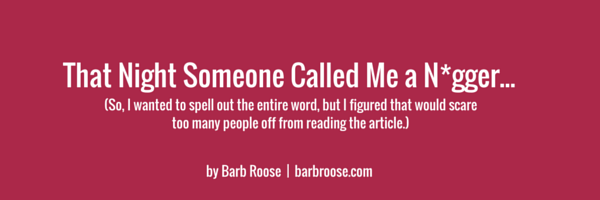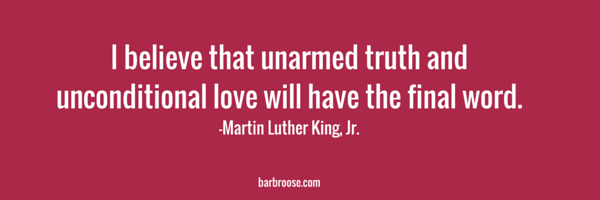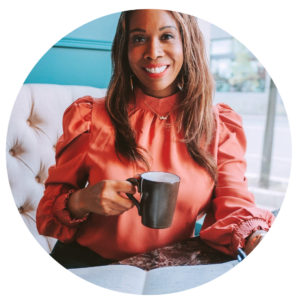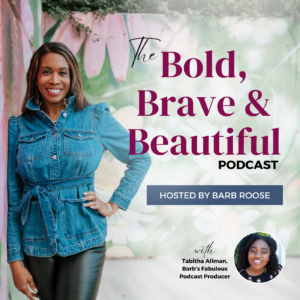One night, I walked into a neighborhood pub. As soon as the door closed behind me, an unknown voice yelled: “What’s that nigger doing in here?”
Was someone talking about me?
I stopped. The room silenced. An electric pause buzzed the air.
My mind calculated what I’d just heard. Then, a thought: Oh, I KNOW that he did not just say that to me.
Another moment passed. A volcano of rage started to bubble deep within. Let me take my shoes off. Earrings, too. Somebody – SOMEBODY, hold my purse.
That incident happened over 20 years ago, however, I remember it like yesterday. On that night, I walked in to enjoy some dinner. Except someone decided that I didn’t belong.
Not based on my personality,
Not based on my family background,
Not based on my ability to pay,
Not based on my company,
BUT based on my skin color, I was unacceptable.
I gazed around the room wondering if anyone would speak up or even say something – anything.
Silence.
So, what did I do?
I held my head high, glided through the hushed crowd and took my seat at the table. Yes, I did.
I suspect that some of you are questioning, “Was it really that bad?” or “Are you sure?” You’re shocked that those things could have happened to me.
But they did. In my early adult years, I learned how to ignore the sales staff that helicoptered while I shopped for shoes. I learned the importance of not messing with my purse while browsing merchandise. I embraced driving 10 miles UNDER the speed limit in certain communities – especially if I was driving at night.
Those situations never shocked me, but I hesitated to recount them because of the shocked-responses from others. Racism thrives in part because it shocks the majority into disbelief. I’ve heard responses such as:
“Are you sure?”
“I can’t believe it…”
“That can’t be!”
“Say it ain’t so!”
Unless you’ve been a direct victim or eyewitness of someone who’s experienced racism, stories about racism will always be shocking.
Yesterday, a cell phone camera captured police restraining an African-American man named Alton Sterling on the ground. Then, those same officers fatally shot Sterling while restraining him. Much of America is in shock. But, not those who’ve been wrestled to the ground like Sterling. Not those of us who’ve witnessed our fathers and brothers stopped for no reason, hassled or pulled from their cars. We’re not in shock. We’re a lot of things – angry and sad sums up a lot. It seems that each #shootingincident buries us deeper into the struggle over of the color of our skin and the fear that lurks within.
There’s nothing about our first-world mindset that wants to accept that racism could be just as pervasive as it was when men began wearing white sheets and Africans exited boats in chains. Apparently, we’re not as awesome as we think we are. Seriously, we discovered how to fly, found a vaccine for polio, developed a nuclear bomb, put a man on the moon, learned how to record on a VCR, taught Grandma how to use Facebook and elected a black man as president twice —
Yet, we can’t accept that racism is woven deeply into the fabric of our American experience.
In our mental model, racists hang out with murders or pedophiles. So, a racist couldn’t possibly be the fun neighbor up the street or the sales manager in your office. We don’t want to call someone a racist unless we can SEE them being racist.
But, how do we call out people who harbor racism in their hearts? Even more so, how do we call it out in ourselves?
You just thought that I called you racist. I didn’t. Only you can answer that. But, I do want you to consider how you’ve been impacted by the roots of racism in your family of origin.
What you believe about race is influenced by the generations of conversations and experiences that happened long before you were born. Your great-grandparents sat and around the table and talked about race. Your grandparents heard them. Your parents heard your grandparents. You listened to your parents. I’m not saying that you agreed with all that was said, but you’ve got to be aware of how those words and stories influenced your thoughts, feelings or behaviors.
Questions to consider:
- When you were a kid hanging out at family gatherings, how did your family talk about race or people from different races?
- Are there any race-related incidents in your family’s history that turned into stories that you were told as a child? How did those incidents impacted how your family lived?
- What are your operating stereotypes? (Asians are smart, black women are loud, black men are scary, white people are fake)
- What are some of the hot-button issues that you know would create tension if you discussed them with someone of another race? Why would those issues create tension?
- What would a friendship with someone from another race look like? (It would not be a true friendship unless you could talk about race.)
So, what now?
- Love must lead the way.
Some of you are tired of hearing people like me talk about ‘love.’ For you, love is for Valentine’s Day. Love is something that gets hot and heavy on Friday night. You don’t really believe that love is a potent power in our universe that can actually affect change. Maybe it’s because we really don’t know how to love. We’ve cheapened it and now, we think that the strategy of love has failed us. Except, our back-up plans of ignorance, hate and anger haven’t worked either.
I love Martin Luther King Jr’s vision for the future. He had hope because he believed in people. He believed in us! He knew that racism would never be eliminated by laws or lawsuits – even though he fought for legal and social justice. But Dr. King preached the same thing Jesus preached long ago: Unconditional love is the only road to the elimination of racism. Racism will die once our unconditional love for each other comes alive.
Love is not a feeling. Love is an action. Love is THE ONLY strategy that can save us from society-destructing ourselves. You’ve got to remove your limits on your love for people. Here’s the ultimate test for love: Decide now that you will lay down your life for another human, no matter their race or culture. When you decide to display that kind of love, then you carry the torch of hope for our tortured nation.
Check out Dr. King’s words:
“I refuse to accept the view that mankind is so tragically bound to the starless midnight of racism and war that the bright daybreak of peace and brotherhood can never become a reality… I believe that unarmed truth and unconditional love will have the final word.”
2. Labels lie. Relationship reveals the truth.
Here’s the thing: We feed what we believe. As long as we believe that all black men might steal our purse or that all white people will stab us in the back, those lying labels will keep us far apart from each other. When we stop looking for evidence to feed our faulty beliefs, then we’ll be willing to open ourselves up.
What would it look like for you to develop a relationship with someone from another race? It’s more than having a “black friend at the office” or “having a white girl to roll with on Friday night.” It means that you get to know someone well enough that you can talk about the things that matter in life. It means that you can agree to disagree – still love each other. It means that you can come from different cultural or socioeconomic perspectives and still respect each other’s viewpoint, even though you may not completely understand it.
3. Start new conversations with your family
If you ever expect that future generations will move away from where we are today, then we have to give them a new target. Focusing them on the target of developing authentic relationships begins with authentic conversation.
How can you have new conversations with your kids or older family members? Consider this:
- Eliminate “them” and “they” when talking with your kids about race. Use actual names and tell personal stories when you talk with your kids about people from different races or cultures.
- Discover how race has impacted your family by talking with older members of your family. Start with the question: “What do you think about what happened to Alton Sterling?” Now, the tension reappears once they finish talking. How do you respond to their answer? Pastor Andy Stanley suggests these questions that you can ask without fear of offending: What led you to that viewpoint? Have you always believed this way?
- Can you promise me that you’ll memorize this verse before talking to ANYONE? Here it is: “Be quick to listen, slow to speak and slow to get angry.” -James 1:19
Speaking out about race isn’t easy. Our experiences with race are just as personal as they are collective. So, thank you for stopping by and checking out this post. I’d love to hear your thoughts on how we as individuals can be the light of hope in American’s dark night of racism. Please leave a comment below.






This is very well thought out! I’ve been looking for tangible ways to begin the game-changing conversation with those surrounding me. Thank you, thank you, thank you.
Racism is alive in America, the world. Went to a college grad party where I was the only “white” person. The older generation and the children treated me no different, loving and laughing. No so with the middle generation. Glares and ignoring me pierced my heart. But the love far out weighed the hate. There’s hope.
Thanks for saying what millions of us believe but don’t always have the right words to express. Mistreating people because of skin color is unconscionable. It can’t be defended with any kind of reason. Clearly, racist people are not speaking / acting from their head, for what they say and do simply cannot be explained rationally. It’s coming from the heart, a very deceived heart.
Let’s not let people get away with it. Let’s be courageous and call it out when we see it. Let’s also pray for the victims…and also the perpetrators.
My thoughts may be out there… But a song came to mind, that has helped me get through some very rough times in my life lately. It’s titled “There’s hope” by India Arie. Very soulful artist..and I believe….there is hope.
Some if my children have much darker skin than I do. I thought I had a decent grasp, for a white woman, on this racism stuff. Then I read Dr. Jawanza Kunjufu’s “Raising Black Boys”. Suddenly racism wasn’t theoretical anymore. Even though my son who is black was a preschooler at the time, it was MY SON who I had to teach how to stay alive when stopped by cops. It was MY SON who I had to teach how not to appear to be shoplifting. It was MY SON who had to learn what parts of town to stay away from. It was MY SON who would have the burden of having such excellent behavior in school that he would be given a chance by the predominantly white staff to not be seen as a stereotype.
And it IS my son who attracts the attention of store security until I, his white mom, makes eye contact with them with the mama bear look. And it IS my son who lives in my house, where a white woman pulled into our driveway just to warn me that there was a black man standing next to our house (my son was 6’3″ at 13).
And I’ve learned I know nothing about racism.
Well said, especially when approaching what has proved to be a very sensitive subject for many.
I read another bit of wisdom from someone who said, “When you meet someone for the first time, stop and realize that you really know nothing about them. You see race, gender, age, and clothing. Forget it all. You know nothing. Those biased assumptions that pop into your head because of the way your brain likes categories, are limiting your life, and the lives of others.”
Great piece Barb. I agree with most of what you said, family and even the neighborhoods influence racism. But, racism is not a one way street, it travels in all directions. I really don’t care if you are black,white,brown,yellow, or even purple with pink polka dots, when a police officer gives you a lawful order you comply. Anyone that knew me growing up knew I have been on the ground cuffed, but I never did fight the police. Even when I had only been in the wrong place wrong time. A lot of people no longer have COMMON curtesy, sense, or respect. Being a Marine gave me a chance to have some of the discussions you have said we need to have. I am glad to report that my kids don’t see color or gender as a barrier, it is how they are treated and treat others that matter. There a host of stories like yours I could tell you from a white males point of view.(LA,NewYork,Detroit). Sometimes just being an outsider can be just as bad or dangerous, like driving through some of the towns in the Appalachian mountains.(TN,KY,WV) Biggest problem is human nature of fear or hated of thing that are not normal to us. I find it hard to believe how many people live with 100 miles were they grew up so that region is all the know first hand, and some have never even left their home state. Best wishes Queen Barb (Homecoming) lol
Thank you Barb. I can only imagine how challenging for you it is to write this piece because I know it is such a very personal issue. My best friend is African American and we talk about him getting the short end of the proverbial stick because of his skin color and I often tell him, “I can’t wrap my head around it because I never give it a single thought.” My family is one of the few that used names to describe personal stories, work stories, whatever they were talking about at the time so none of the three of us children ever really thought about it. In the same vein, he tells me he can’t wrap his head around what it’s like to be gender-discriminated against because he’s a guy.
I needed to read this today more than you realize. The last few days have been filled with a level of hopelessness for this country that I’ve never experienced in my life. It’s hard not to be discouraged in the face of such anger, sadness and blatant hatred. So thank you for giving me back a little hope in people this afternoon. I needed it. Take care.
Inspiring, which you have been since I can remember. My earliest memory is of you and your family looking at me on your sofa after we escaped our house fire. I pray that love for each other continues to spread. Like the loved that was shared by your family with mine that early morning and has continued to be shared. That is what the world needs!!
Ron, your note touches my heart. I will never forget that unforgettable morning. So many memories of how our families were connected together. As Matt and I celebrate our 24th anniversary next week, we’ll pull out the figurines that sat atop our wedding cake. I’ll never forget how you “personalized” those figurines so that the wife could look like me. Thanks to you and Diane for being such loving and kind neighbors to our family for so many years.
The sermon that Barb gave today really resonated with me. Especially the part about…”What are you going to do to make a difference to promote unity?”… especially with someone different than yourself???
This is an area I feel good about but not great. I wondered what can I do? I am the director of a nursing program which is approximately 50% white and the other half is multi cultural being Black and Hispanic. Many of these woman are raising children, living in poverty, with many obstacles every day. However, these students get up every day and stay committed to making a difference in their lives. I can tell I often have to earn the trust from many of the students in the minority groups. That’s ok with me because I empathize with the hardships and the affects that our cultural divide has caused. I care about each and every one of the students and do my best to serve them through a kind and equitable manner.
I have been praying about offering my home up for small groups or weekend retreats to be prayerful over racial/cultural division and improving our inner beauty to help us share Christ’s compassion toward others. I love to be a hostess and have the qualities for a greeter at church. My strengths are hostess and compassion and I would like to help any way that I can.